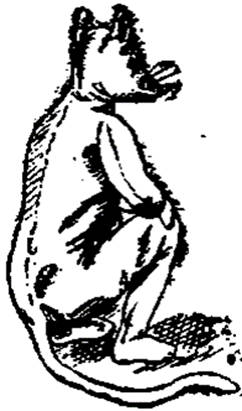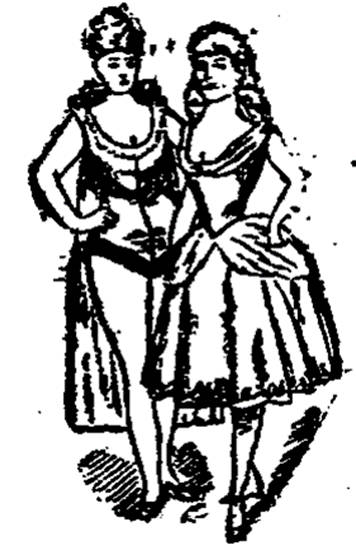This article has been transcribed from a copy of the Cardiff Times in the online collection of scanned Welsh newspapers 1804-1919 in the National Library of Wales, with grateful recognition of the free access accorded to all readers. Paragraph breaks have been introduced for easier reading. W. M. Thackeray created the decorated initial P for Vanity Fair.
Explanatory notes
'Genest[e]': John Genest English clergyman and theatre historian.
Colley Cibber (1671–1757) was an English actor-manager, playwright and Poet Laureate.
'hits’: pointed remarks or quips which 'hit' their targets.
Lord Dundreary: a good-natured, brainless aristocrat in the play Our American Cousin by Tom Taylor (1858).
olla podrida: a highly spiced Spanish stew. —— David Skilton

antomime, in its truest sense, has ceased to exist, and in this nineteenth century of culture and learning the public is treated to a mixture of music-hall fooling and harlequinade horseplay; a display of vulgarity and mediocrity which our fathers would have hissed off the stage had any theatrical manager had the audacity to present it to them. Yet season after season these inane — one might almost say insane — productions are to be seen in the best theatres, and thousands of pounds are spent in dressing and backing up pantomimes which are [a]s like unto pantomime proper as chalk is like unto cheese.

The harleqinade.
Originally pantomimes were, as their name denotes, performances done in dumb show, and they are, on the authority of Genest[e],[i] said to have heen introduced into England about the year 1723.
Colley Cibber[ii] tells of a pantomime piece founded on the story of 'Mars and Venus,' wherein the passions were so happily expressed, and the whole story so intelligibly told by a mute narration of gesture only, that even thinking spectators allowed it both a pleasing and rational entertainment. Now if it were possible so many years ago, when things theatrical were in their infancy, to tell in dumb show an intelligent story how is it that to-day we are, in spite of our knowledge and experience, compelled to put up with pantomime wherein, nine times out of ten, the ordinary nursery tales beloved of the children are so badly handled by the writers of pantomime books that they are as unintelligible as the dumb shows of the past were intelligibly [sic] and entertaining. I was told, not very long ago, by a stage manager of many years' experience, that the book was almost of less importance than any other part of the machinery of pantomime, and that the success or failure of a modern pantomime depended but a small extent upon its author.
On this point I join issue with the stage- manager, for if the framework or construction of a pantomime book be faulty I am certain, from experience, that the production will invariably run the risk of failure. An author's lines, I admit, do not, at this day, count for much.
And why?
For the very good and simple reason that many of the people engaged are unable to speak them. This tendency [s]to I disregard the author is of recent growth and may, I think, be said to date from the time when music-hall performers began to usurp the places of legitimate actors and actresses in pantomime.

Pantomime wolf./p>
Modem pantomime books are made, not written, and it is this very introduction of uneducated 'speciality' people which is responsible for the downfall of interesting, sensible, and pleasing pantomimes.
<>I can remember the day when a pantomime writer took some pains with his book, filled it with smart lines, good puns, and topical and local hits.In a book, done for a theatre with a high reputation for pantomimes, which I read the other day, I found all these essentials to success conspicuous by their absence.
In the days departed the actors and actresses paid full attention to the author, and made his points and lines tell with the audience. Now a-days such a state of affairs is rare indeed. At a well-known provincial theatre recently a big star from the music-halls was engaged to play a principal part in the Christmas show. On turning up at the first rehearsal he went to the stage-manager, and, showing him his part, said, 'What's this for?' 'That's your part; you've got to learn it,' replied the official.
'Learn this,' said the astonished star. 'Why it takes me twelve months to learn a song.'
And the truth of his confession was fully demonstrated for he never learned the part, and stuck to the text that he was 'engaged to do his business,' which consisted of singing so-called comic songs which were devoid of all the elements of fun

Pantomime fairy.
It is performers of this order, and their name is legion, who kill all attempts on the part of the author, and who mar by their vulgarity and ignorance the best efforts at genuine pantomime.
As they are the bugbear of the author who has to write parts for them, so are they the bugbear of the stage manager, who, having engaged them at extravagant salaries, is bound to utilise such ability as they possess to the best advantage, and generally to the disadvantage of more talented people, who, if they had the opportunity, would do much to keep pantomime free from the blots which are yearly to be seen in it, even at the best of theatres.
Even the songs introduced into modern pantomime are, for the most part, entirely and totally irrelevant to the subject on which the I book is based.
Yet they are put in year after year, and people who would turn their eyes up in pious horror if any one suggested their visiting a music-hall listen, night after night, to the very songs which have, during the year, become the favourites of the music-hall patrons. Why respectable and educated people should be compelled to listen to a song which tells of the adventures of a gay young spark of not too moral habits, and has for its catch-phrase the charming words 'Hi Tiddly Hi, Ti Ti Ti,' is one of the things which, as Lord Dundreary put it, 'no fellah can understand. ['] Yet songs of this type are to be found in ail the pantomimes throughout the country, and people are paid big salaries for singing them.
The result is that the story suffers from the fact that frequent opportunities have to be given for the introduction of such songs, and changes have to be made for the benefit of people whose 'business' must go in somewhere, and who can, in the majority of cases, do nothing but the special items they have hawked about music-halls and pantomimes for years.

Principals.
All of which points to, and strengthens, my contention that the construction of a pantomime is of more importance than many people professionally interested are apt to think. is of more importance than many people professionally interested are apt to think.
Let the pantomime author lay down clearly the framework of his story, indicating where special items can be introduced without breaking the thread of his tale, and modern pantomime would at least be intelligible and rational, while there would be no interference with the story for the benefit of the genus music-hall performer.
Until this be done, and done properly, pantomime will continue to be an olla podrida of absurdity — with neither head, tail, nor middle.
Another danger of modern pantomime is the damage it does to the reputation of artistes of high standing in the world dramatic. Unless the parts they are provided with have a strong connection the story, which is seldom the case, they are certain to be overshadowed by the rough horse play of the music-hall people in the cast, whose only idea is to get laughs, no matter how they get them. Many a clever legitimate comedian, engaged at a high salary, has failed in pantomime owing to a bad part and a preponderance of 'speciality' turns.
Bad parts are always the bête noire, but in the legitimate drama an actor is not hampered by horse-collar comedians, as he invariably is in modern pantomime. Thus a bad or ill-fitting part in pantomime is but the prelude to certain failure to the artistic comedian, who is not able to compete fairly with those inartistic nondescripts to whom a part is of no consequence provided they get an opening in a big scene for the special business. They are the little old men of the sea of pantomime, and, by their tenacity and cheek, do more with their limited stock-in-trade than the actor or actress can do after years of experience and training, for he or she is baulked and blocked at every turn and corner by the inartistic buffoonery of the mechanical and misnamed music-hall 'comedian.'
Links to Related Material
Last modified 19 April 2022